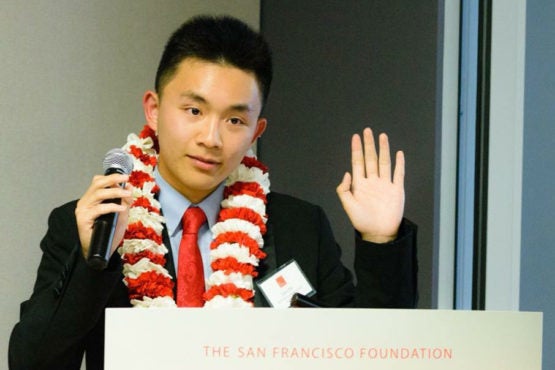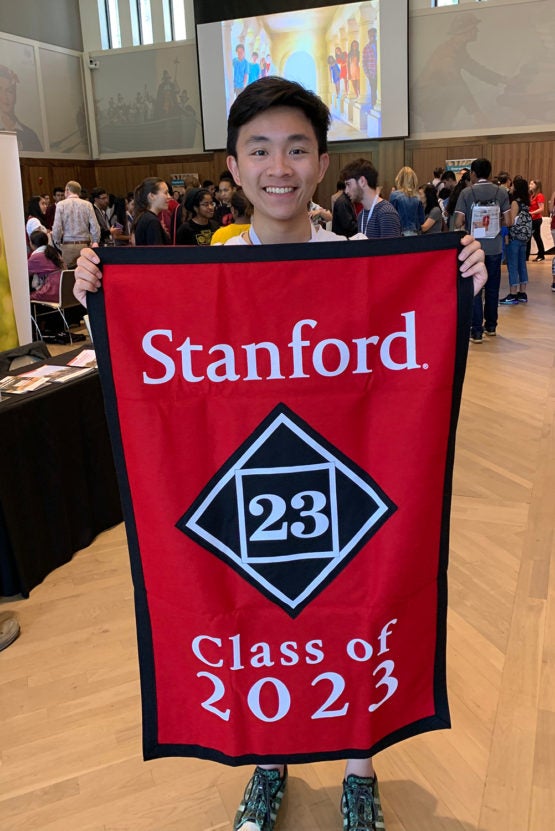Joining Stanford: Galahad of San Francisco
When Galahad Mai fled a tumultuous life in China four years ago for a better one in the United States, he never imagined that one day he would make it to Stanford. Today, he is among the incoming members of the Class of 2023.
Growing up in China, one of Jiayu Mai’s favorite stories was the Legend of King Arthur. He was particularly drawn to Sir Galahad, one of the three knights at King Arthur’s Round Table to reach the Holy Grail – a miraculous cup offering eternal youth and happiness.

Galahad Mai, ’23, addresses attendees of an event hosted by The San Francisco Foundation. (Image credit: Courtesy Galahad Mai)
“I loved Sir Galahad’s bravery and his virtue and his intelligence,” Mai said. “I loved how he had a unique experience and eventually did a great thing. He embodied a lot of spirit that I wanted. I wanted to be Sir Galahad.”
Mai was so impressed with the fabled knight that he adopted “Galahad” as his English name when he fled a tumultuous life in China and immigrated to San Francisco four years ago. The transition to the United States proved to be challenging for Mai, who didn’t speak English. But after four years of hard work, grit and determination, he found his own Holy Grail in the form of opportunity, academics, civic engagement, activism and a spot in Stanford’s Class of 2023.
Mai arrives on the Farm for his freshman year with interests in neuroscience, prosthetics and mental health counseling.
A new start
On May 28, 2015, Mai arrived in the United States for the first time. His mother and stepfather brought him to San Francisco in the hope of giving him a better life than the one he had in China, where he suffered from an abusive father.
Mai faced numerous challenges as a new immigrant, including culture shock, a language barrier and financial struggles. To aid his assimilation, he enrolled at San Francisco International High School, which serves immigrants from around the world. Mai said his first year was stressful because his English skills did not progress as fast as he had expected. The stress was exacerbated by Mai’s role as his family’s translator.

Galahad Mai of San Francisco attends Admit Weekend. He is among the members of Stanford’s Class of 2023. (Image credit: Courtesy Galahad Mai)
“Inside the house, there were a lot of responsibilities on me, like handling the mail and making phone calls,” Mai said, adding that simple tasks like purchasing groceries were difficult. “I used to be a confident boy, but when I came here and I realized there were things I couldn’t do. It was really hard [to adjust].”
Mai hunkered down in his studies and became proficient in English within a year. The hard work paid off, not just academically, but also socially.
“As my English progressed, I was able to start talking to different people, and I was able to try new things,” he said.
He befriended kids from other backgrounds, noting that his high school was the first place he’d ever met someone of Latino descent, for instance. After befriending students from other local San Francisco schools, he began to hear about the challenges they faced.
“I started learning that a lot of their educational needs were not met,” he said. “I really appreciated the right to get an education, so I wanted to do something to help.”
In 2018, Mai successfully ran to be the student delegate on the San Francisco Unified School District’s board. After his election, he represented students across the city at school board meetings, where he advocated for a number of issues, including school lunches for students taking classes during the summer. Mai also advocated for the “Undocumented, Unafraid and United Students Resolution,” which expanded protections and services for undocumented students and their families in San Francisco. He also helped organize an annual fundraising event to gather clothes and gifts to give to homeless children throughout the city during the holidays.
Joining Stanford
By his senior year of high school, Mai had built an impressive resume, marked by top academic scores and political activism. He applied to 21 colleges but said that he was so surprised to learn of his acceptance to Stanford that it took a while to sink in. After receiving Stanford’s generous financial aid package and attending Admit Weekend this past spring, he said he knew he had to accept the offer.
“It definitely helped me understand the school better, and it made me more confident that I could succeed as a Stanford student,” Mai said.
This summer, Mai has returned to China to spend time with relatives – his first time back since leaving four years ago – before he begins college at the Farm. Once at Stanford, he intends to help his classmates improve their well-being by working as a student peer health counselor. Although he is unsure what his major will be, he said he is fascinated by prosthetics, robotics and neuroscience.
“I’m interested in learning about human mental activity and the science behind it,” he said, adding that his interest is partly spurred by his own childhood ordeals. “I want to understand why I have emotions related to those traumas and why I became an emotional person,” he said.
Mai still bears the scars of his childhood abuse – a reminder of how far he’s come in such a short amount of time. But he said he wouldn’t change his past because the experience made him more mature and better prepared for whatever the future brings.
To other immigrant students with similar struggles, Mai encourages them to be tenacious, just as Sir Galahad was when he pursued the Holy Grail.
“Don’t give up!” he said. “You will eventually get to a place you never imagined before as long as you work hard and work smart.”
